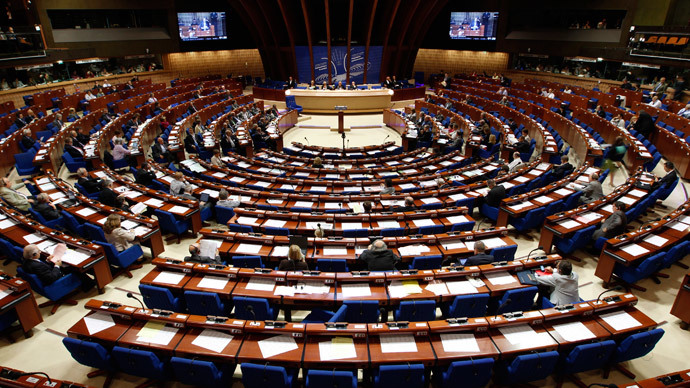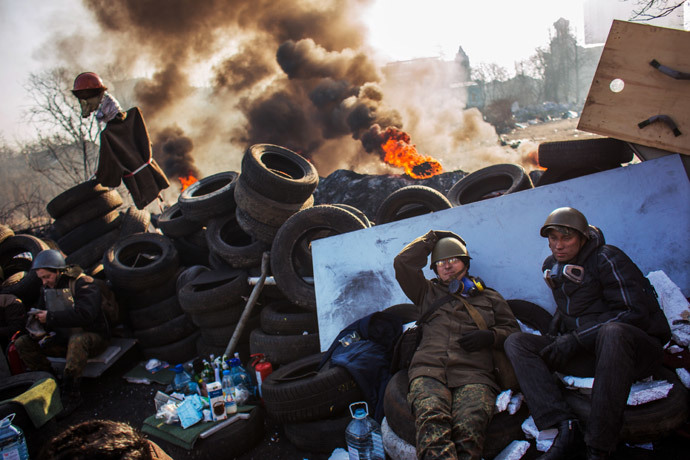West increases tensions over Crimea for political gain

The PACE decision to suspend Russia’s voting rights and exclude it from all leadership positions in 2014 is yet another, mostly symbolic, retaliatory measure by the West in response to Crimea’s vote to reintegrate with Russia.
Moreover though, it is an affirmation of Moscow’s reiteration of the hypocrisy of the West with regard to democracy and the rule of law.
PACE is an advisory body within the Council of Europe, one that makes recommendations and releases opinions, but is understood as being symbolically, rather than practically, powerful. However, their recent resolution to suspend the voting and leadership rights of the Russian delegation is an attempt to further isolate Russia diplomatically.
But beyond the rhetoric and symbolic gestures, there is a much more deeply cynical motive for the Western powers at the helm of PACE: to provide the foundation and basic arguments for the continued demonization of Russia and, consequently, the expansion of NATO.
Although PACE itself does not have official powers, it does provide a political and diplomatic forum through which the West can speak without having to go to the level of the United Nations, or even the European parliament. Naturally, many experts in Russia and around the world are scoffing at this recent decision, arguing that PACE has no real authority. What they fail to realize however, is that the intention of the resolution is not to punish Russia, but to isolate and demonize it.
Hypocrisy of PACE
As an organ of the Council of Europe, PACE does have some degree of influence due to its advisory role to the Council as a whole. In particular, PACE is influential in areas such as human rights, where its recommendations have a significant impact on European policy generally. The institution sees itself as a defender of the rule of law in Europe. It is within this human rights and rule of law context that PACE’s recent anti-Russian resolution must first be evaluated.
The resolution states: “The Monitoring Committee considers that the actions of the Russian Federation leading up to the annexation of Crimea, and in particular the military occupation of Ukrainian territory and the threat of the use of military force, the recognition of the results of the so-called referendum and subsequent annexation of Crimea into the Russian Federation constitute, beyond any doubt, a violation of international law, including of the United Nations Charter.”
Inconsistencies and obvious double standards abound. First, it would seem that PACE is rooting its arguments against Russia in international law which it seems to selectively apply. On the one hand, they argue that Russia has violated international law through a “military occupation” and “threat of military force.”
Leaving aside the obvious silliness of saying that both of these mutually exclusive events took place, there is the glaring and unmistakable fact that the United States and Europe have, numerous times, violated, or otherwise manipulated, international law such that precedents regarding its interpretation now exist.

The NATO bombardment of Serbia, and subsequent independence and absorption into NATO of Kosovo, was a blatant violation of international law which resulted in the deaths of many innocent Serbs and the ethnic cleansing by Albanians and other groups of many in Kosovo. Despite not having a UN Security Council resolution, NATO engaged in an illegal campaign that killed many, and the Council of Europe and PACE had little to say on the matter, other than expressions of adulation and support.
Just as with Kosovo, South Sudan had a referendum, with the Sudanese government in Khartoum not only under ‘threat of military force’, but with a vivid memory of military force having been used to bomb the central pharmaceutical factory in the country little more than a decade earlier. It was no secret that the Western powers were securing the right of South Sudan to vote on their future with Western military and diplomatic force as the guarantor. Again, the Council of Europe and PACE actively supported the actions.
It should be noted also that the language of the resolution, like much of the rhetoric emanating from the West in recent weeks, attempts to portray Russia as an imperial aggressor. This propaganda narrative is utterly cynical as it is merely a clever pretext to force Europe, and indeed the world, to accept as unquestionable, the continued need for NATO and, more to the point, its expansion.
But the hypocrisy and cynical posturing doesn’t stop there. PACE Deputy President Axel Fischer stated in a recent interview with Deutsche Welle: “We don't want the situation to escalate any further and we want to keep the talks with Russia going…We have a clear point of view, too: we have clear criteria for the Council of Europe that are in accordance with the rule of law, and we know how democracy should function and how elections should be conducted. No matter who did what in Ukraine and in Kiev, we want human rights to be observed and the rule of law to be guaranteed. That is the Council of Europe's duty.”
Interestingly, Deputy President Fischer grounds his (and PACE’s) arguments on rule of law and accepted norms of ‘how democracy should function’ and ‘how elections should be conducted’, while completely ignoring those precise issues when it comes to the illegal coup that overthrew the democratically-elected government of Yanukovich and replaced it with a hand-picked group of neoliberal servants and neo-Nazi extremists.
It would seem then that, like their partners in the United States, PACE is conveniently manipulating the meaning and interpretation of these concepts to fit a preconceived narrative of ‘Russian aggression’ and European ‘defense of democracy’.

In fact, his comment “no matter who did what in Ukraine and in Kiev” is itself a clear obfuscation designed to absolve the US and Europe of responsibility in the events that led up to the coup, as well as absolve the Right Sector and other groups of their egregious crimes against the people of Kiev and Ukraine more generally.
Essentially then, rather than an honest evaluation of the events by an impartial body, PACE and its leadership are merely acting as the dutiful midwives of US-EU-NATO foreign policy which seeks to isolate and alienate Russia, heaping all blame for the crisis in Ukraine onto Moscow’s shoulders.
Symbolic sanctions, empty threats
While the United States and its European allies continue to ratchet up the rhetoric against Russia, they have demonstrated for the world the impotence of their own position. On one hand, there is much tough talk coming from Washington and Brussels regarding sanctions and other punitive measures against Russia. However, the sanctions have been so limited in scope as to be regarded as merely symbolic, a means of saving face politically. These actions have revealed the degree to which Russia is an integral part of the European economic future, and its position as a global power, such that for all of its hand-wringing, the West is mostly powerless.
The sanctions on individuals close to Russian President Putin have been regarded by keen political observers as largely ceremonial. So too should this latest resolution from PACE. The US and Europe are tremendously fearful of substantive sanctions against Russia which they correctly understand would have significant negative effects on the global economy. They recognize also that, were they to do nothing, then for all their bluff and bluster, they would be exposed as the proverbial paper tigers. And so, the world is left watching the melodrama playing out in international forums and in the headlines as politicians try to score political points at the expense of all important relations with Russia.
The suspension of the Russian delegation from the Parliamentary Assembly of the Council of Europe is little more than another of the tit-for-tat political maneuvers from an institution that is mostly symbolic in the first place. However, it is yet another insult aimed at Moscow which can only exacerbate the already tense situation. With a rapidly deteriorating security situation in Ukraine, coupled with a looming economic collapse in that country, as well as the continuing wars in Syria and Afghanistan, and other issues that require US-Russian cooperation, it seems that the West’s policy of alienating Russia is only going to bring more chaos, more conflict, and more crises.
The statements, views and opinions expressed in this column are solely those of the author and do not necessarily represent those of RT.
The statements, views and opinions expressed in this column are solely those of the author and do not necessarily represent those of RT.













